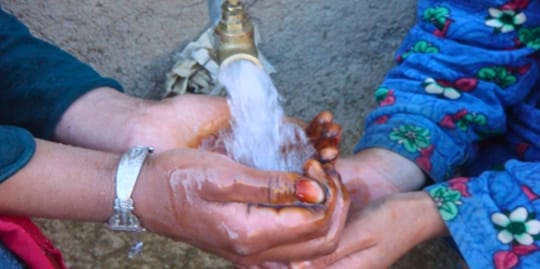From Sacred Springs to Safe Hands: Reclaiming Morocco’s Water Wisdom for Global Handwashing Day

In Morocco, where courtyard sabils cool the air of old medinas, where saqiyas thread along terrace walls, and where ablutions mark the quiet threshold between work and prayer, water is a language of care that moves through family kitchens, mosque courtyards, and mountain fields in a single continuous story of hospitality and survival. However, UNICEF estimates that there are three in ten people worldwide, about 2.3 billion, still do not have a basic handwashing facility with water and soap at home, and hundreds of millions have no facility at all. Global Handwashing Day on October 15th asks us to turn cultural respect for water into daily protection for health and dignity.
Across many trials and program evaluations, public health agencies report that washing hands with soap can reduce diarrheal disease by 23% to 40%, lower respiratory infections by 16% to 21%, and decrease school days lost due to gastrointestinal illness by 29% to 57%. In healthcare settings, effective hand hygiene at the point of care can prevent up to 50% of infections acquired during treatment, and in many cases, the savings it generates exceed the cost of implementation.
The goal of universal hygiene remains far from reach. Since 2015, about 1.6 billion people have gained access to basic hygiene services, lifting global coverage from roughly 66% to about 80%. Even so, by 2024 an estimated 1.7 billion people still lacked basic services, including more than 600 million with no handwashing facility at all. In Morocco’s rural regions, the path to clean water and safe hygiene remains uneven and difficult. According to a 2022 report by the WHO/UNICEF Joint Monitoring Programme for Water Supply, Sanitation and Hygiene, only 62.17% of rural households in Morocco have access to safely managed drinking water; 45.86% have access to safely managed sanitation; and 64.70% have access to materials for basic hygiene.
In response, the High Atlas Foundation (HAF) works to build not just water systems but the conditions that allow hygiene to take root and last. HAF’s clean water projects are designed hand in hand with communities, rely on local materials and builders, and include training so that what is installed can also be repaired, owned, and sustained. The goal is not only to bring water to homes, schools, and clinics, but to ensure that the flow continues long after the construction ends.
A deep respect for water runs through Moroccan life, being cherished as a source of nourishment, care, and community. This understanding is reflected in how the High Atlas Foundation approaches its work. HAF’s water, sanitation, and hygiene (WASH) projects have helped bring safe drinking water to many households while also raising awareness about hygiene practices. These efforts have played an important role in improving public access to reliable information on water quality and the health risks associated with unsafe water. In addition, they have supported the transfer of skills for maintaining and repairing water systems, helping communities sustain these improvements over time.
After the High Atlas earthquake in 2023, HAF developed plans to repair and rebuild damaged infrastructure in villages across Al Haouz and Ouarzazate. To date, these efforts have extended to over 20 villages, where HAF has rehabilitated or constructed 12 irrigation basins, 9 potable water tanks, over 62 kilometers of potable water pipes, and 37 kilometers of irrigation canals. Additionally, the foundation has installed 467 solar panels to power 12 water wells, supporting stable water access in mountainous terrain. These initiatives aim not only to restore what was lost but to rebuild with resilience. They all ensure the essential conditions that make daily handwashing and safe hygiene both possible and lasting.
Morocco’s profound relationship with water has been shaped through ritual, farming, and community care. The respect that sustained shared springs and village canals can now guide a collective effort to ensure that clean hands are part of everyday life. This means placing water and soap within reach in every home, making handwashing a regular practice in schools, encouraging health workers to lead by example, and supporting public budgets that prioritize long-term maintenance.
We understand that access must become routine, and routine must grow into lasting protection. On this Global Handwashing Day, the High Atlas Foundation calls on all of us–community members, educators, policymakers, and partners–to treat clean hands not as a privilege, but as a shared responsibility and a basic right that begins with infrastructure and is sustained by care.
Wanxu Li is currently a volunteer at the High Atlas Foundation in Morocco and a student at the University of Toronto in Canada.